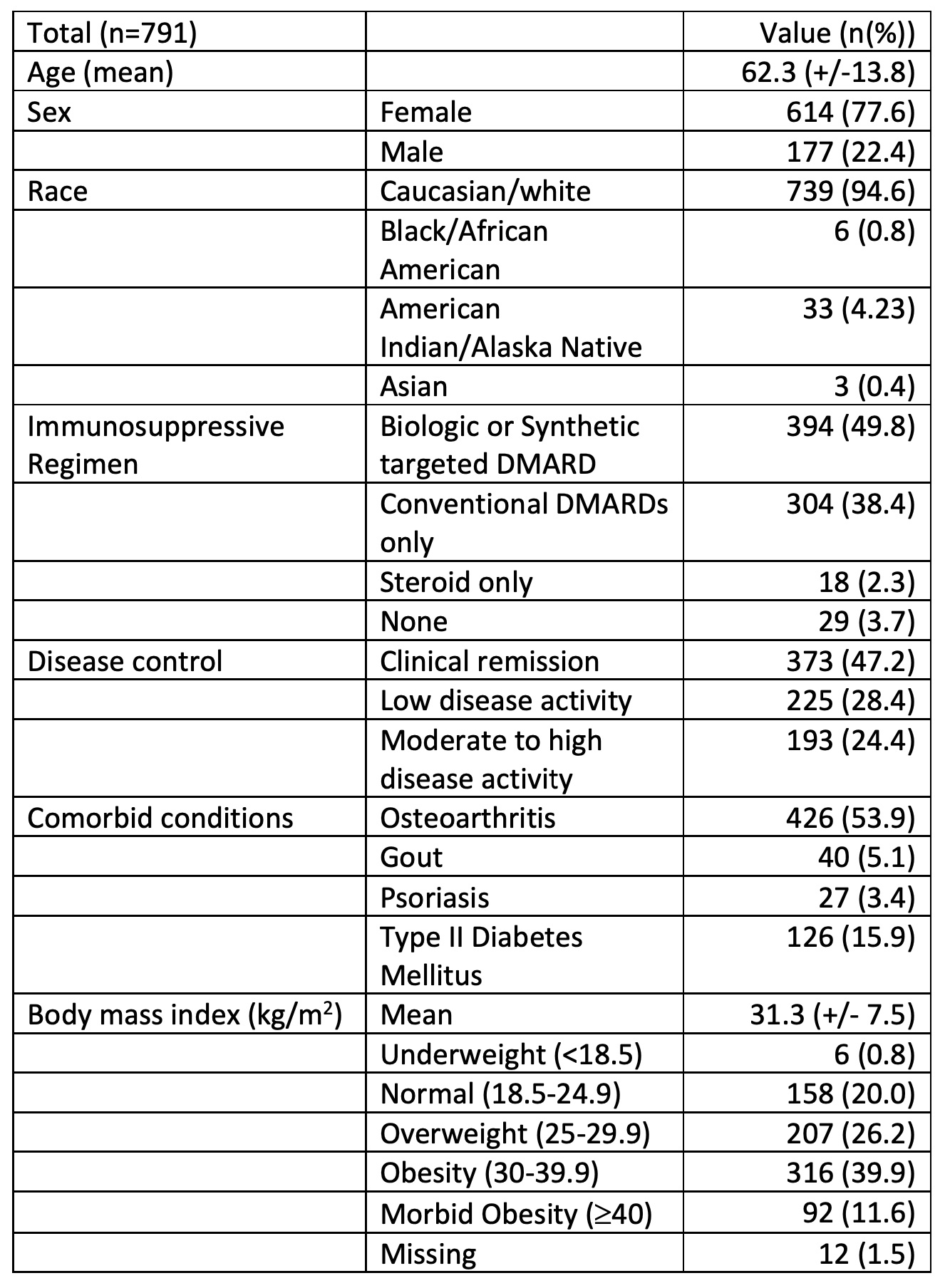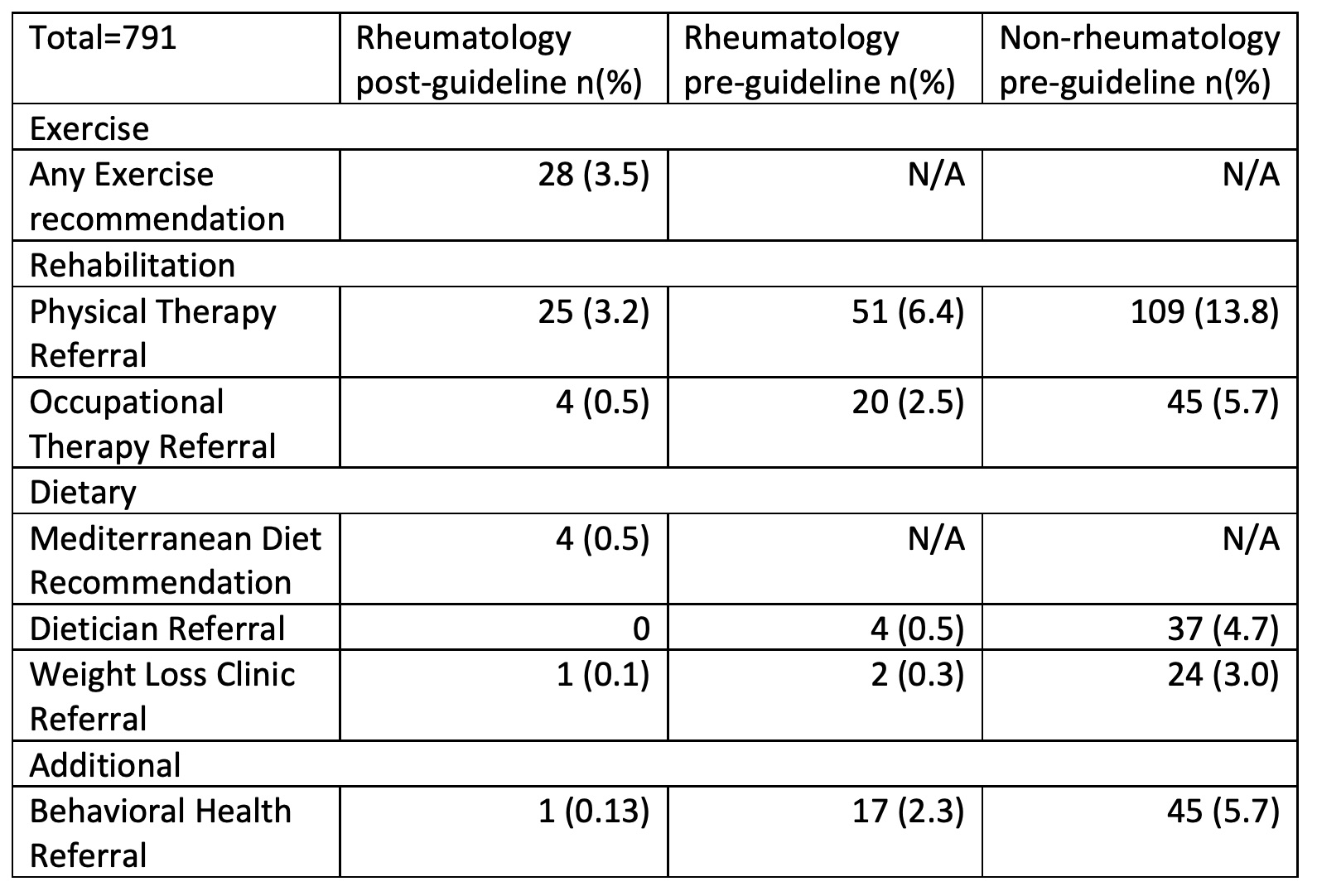Session Information
Date: Tuesday, November 14, 2023
Title: (1895–1912) Measures & Measurement of Healthcare Quality Poster II
Session Type: Poster Session C
Session Time: 9:00AM-11:00AM
Background/Purpose: In November 2022, the American College of Rheumatology (ACR) released the ACR Guidelines for Exercise, Rehabilitation, Diet, and Additional Integrative Interventions for Rheumatoid Arthritis with several lifestyle recommendations in dietary, exercise, rehabilitation categories as well as additional integrative and mental health guidance.Limited data on implementation practices post-guideline are published. Data were reviewed to determine rates of adherence to the guideline post-creation as well as referral patterns in the year prior to guideline release for both rheumatology and non-rheumatology clinicians.
Methods: We identified patients 18 and older with a primary diagnosis of rheumatoid arthritis seen within the rheumatology department at our institution between November 15, 2022 and February 15, 2023 utilizing an electronic medical record (EMR)-extracted report and manual chart review.Patients were excluded if they had expired within the study period or had an alternative primary rheumatologic diagnosis. IRB approval was obtained.
Results: Data were analyzed for 791 patients. Mean (SD) age was 62.3 (13.8), 77.6% of the patients were female, and 94.6% were white. Mean (SD) BMI was 31.3 (7.5) kg/m2. 394 (49.8%) were receiving biologic or synthetic targeted disease-modifying anti-rheumatic drug (DMARD) therapy (Table 1). 28 (3.5%) patients received a recommendation for an exercise regimen in the 3-month study period. 25 (3.2%), 4 (0.5%), and 4 (0.5%) patients received post-guideline referrals to physical therapy, occupational therapy, and dietary recommendation for the Mediterranean diet, respectively (Table 2). In the year prior to guideline release, 51 (6.4%) patients received physical therapy referrals from a rheumatologist and 109 (13.8%) from a non-rheumatologist. 3 (0.4%) patients received a weight loss clinic referral from a rheumatologist and 24 (3.0%) from a non-rheumatologist pre-guideline. 4 (0.5%) patients received dietician referral from a rheumatologist and 37 (4.7%) from a non-rheumatologist pre-guideline.
Conclusion: The adherence to the 2022 ACR lifestyle guidelines for RA was low. For interventions studied, there was no significant increase in referrals or recommendations post-guideline. Though there was significant obesity in the patient population with higher-than-average BMI (average BMI ~26.5 in the United States), only a handful of patients received a dietary intervention from rheumatology.Dietary interventions were low for both rheumatology and non-rheumatology clinicians pre-guideline release. Study limitations include descriptive methods without comparisons for statistical analysis as well as short duration of follow up. Several factors such as patient preferences, workload and complex disease management, as well as the recency of the guideline release may offer explanations for low uptake of recommending lifestyle interventions.Future work is needed to create practical recommendations and measures of quality for lifestyle intervention in patients with rheumatoid arthritis that balance patient needs and provider workload.
To cite this abstract in AMA style:
Nichols L, Scheibe M, Erie E, Nickell A, Sahmoun A. Implementation Practices for the 2022 American College of Rheumatology Guidelines for Exercise, Rehabilitation, Diet, and Additional Integrative Interventions for Rheumatoid Arthritis [abstract]. Arthritis Rheumatol. 2023; 75 (suppl 9). https://acrabstracts.org/abstract/implementation-practices-for-the-2022-american-college-of-rheumatology-guidelines-for-exercise-rehabilitation-diet-and-additional-integrative-interventions-for-rheumatoid-arthritis/. Accessed .« Back to ACR Convergence 2023
ACR Meeting Abstracts - https://acrabstracts.org/abstract/implementation-practices-for-the-2022-american-college-of-rheumatology-guidelines-for-exercise-rehabilitation-diet-and-additional-integrative-interventions-for-rheumatoid-arthritis/


